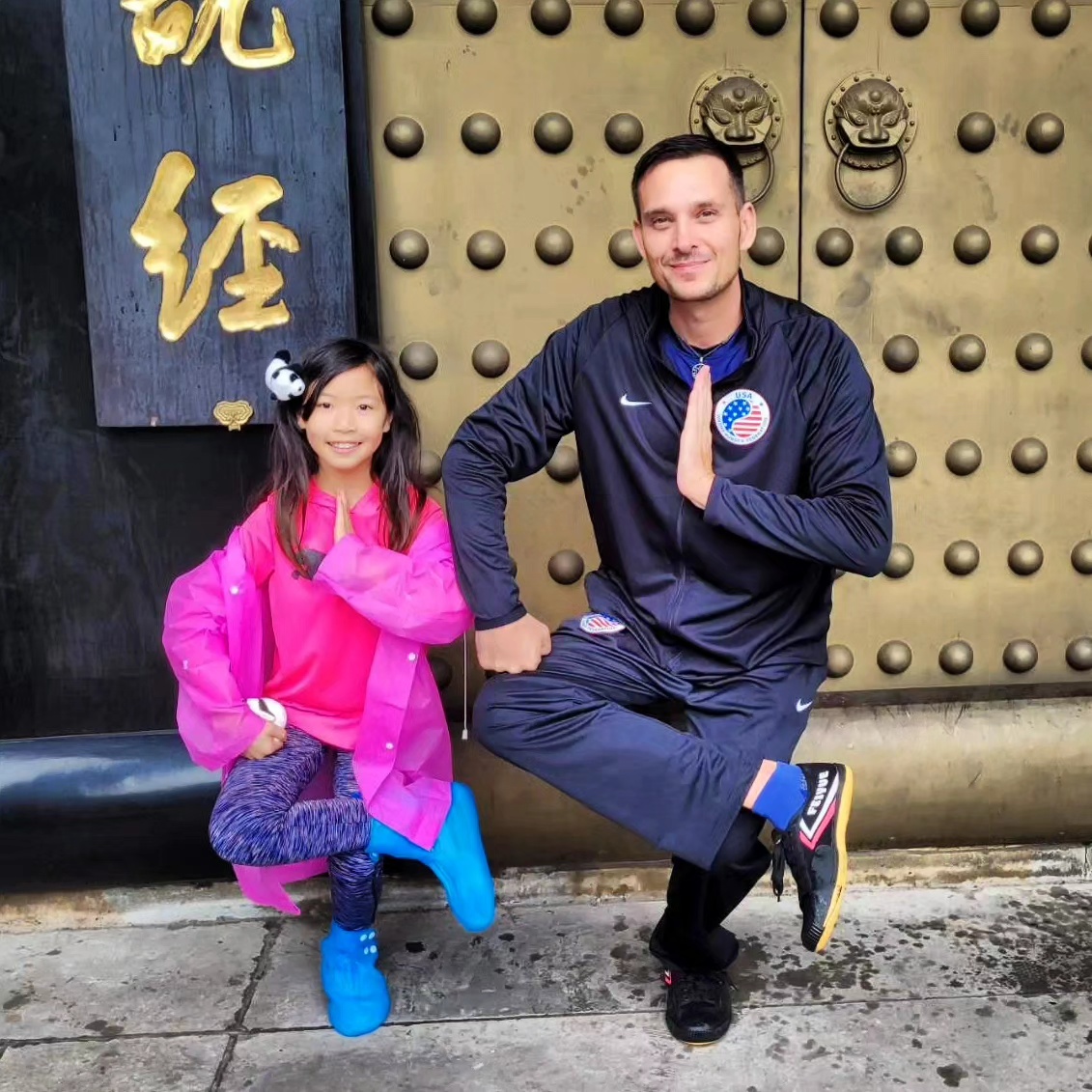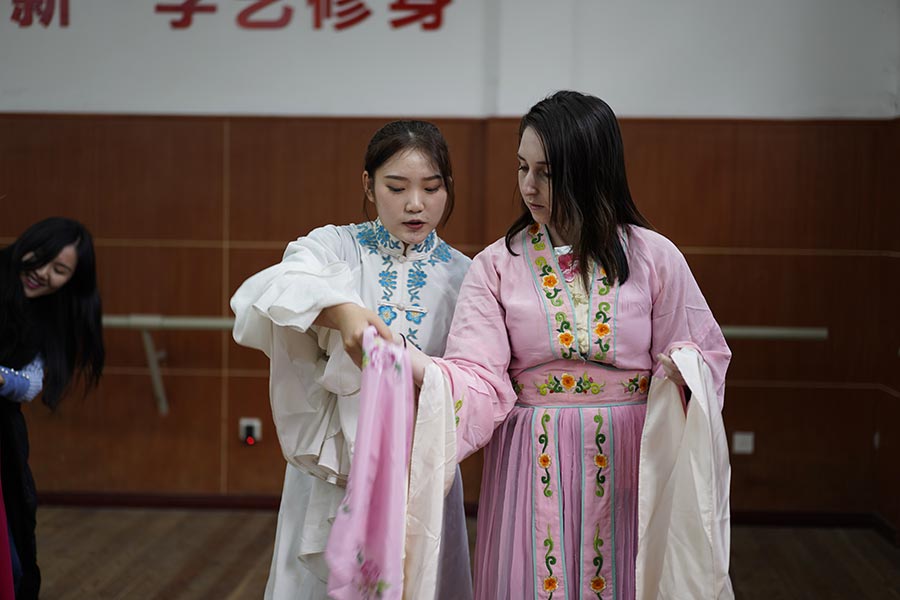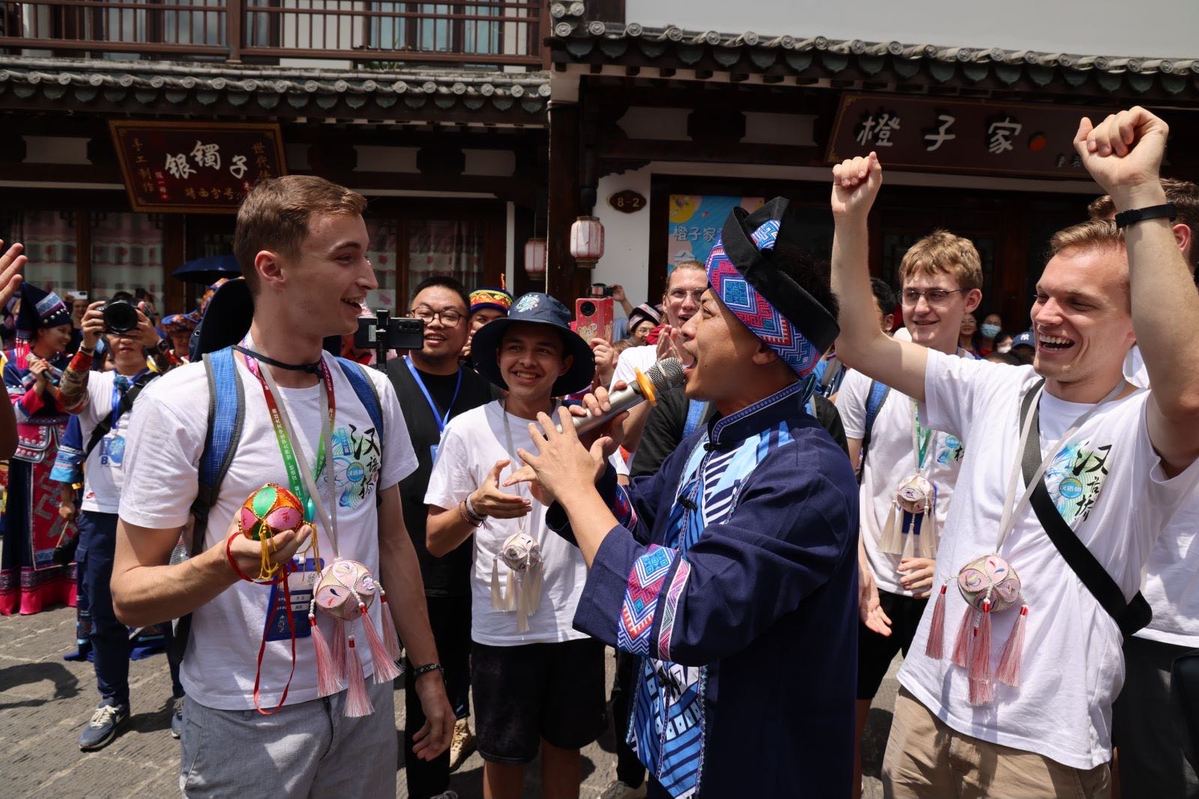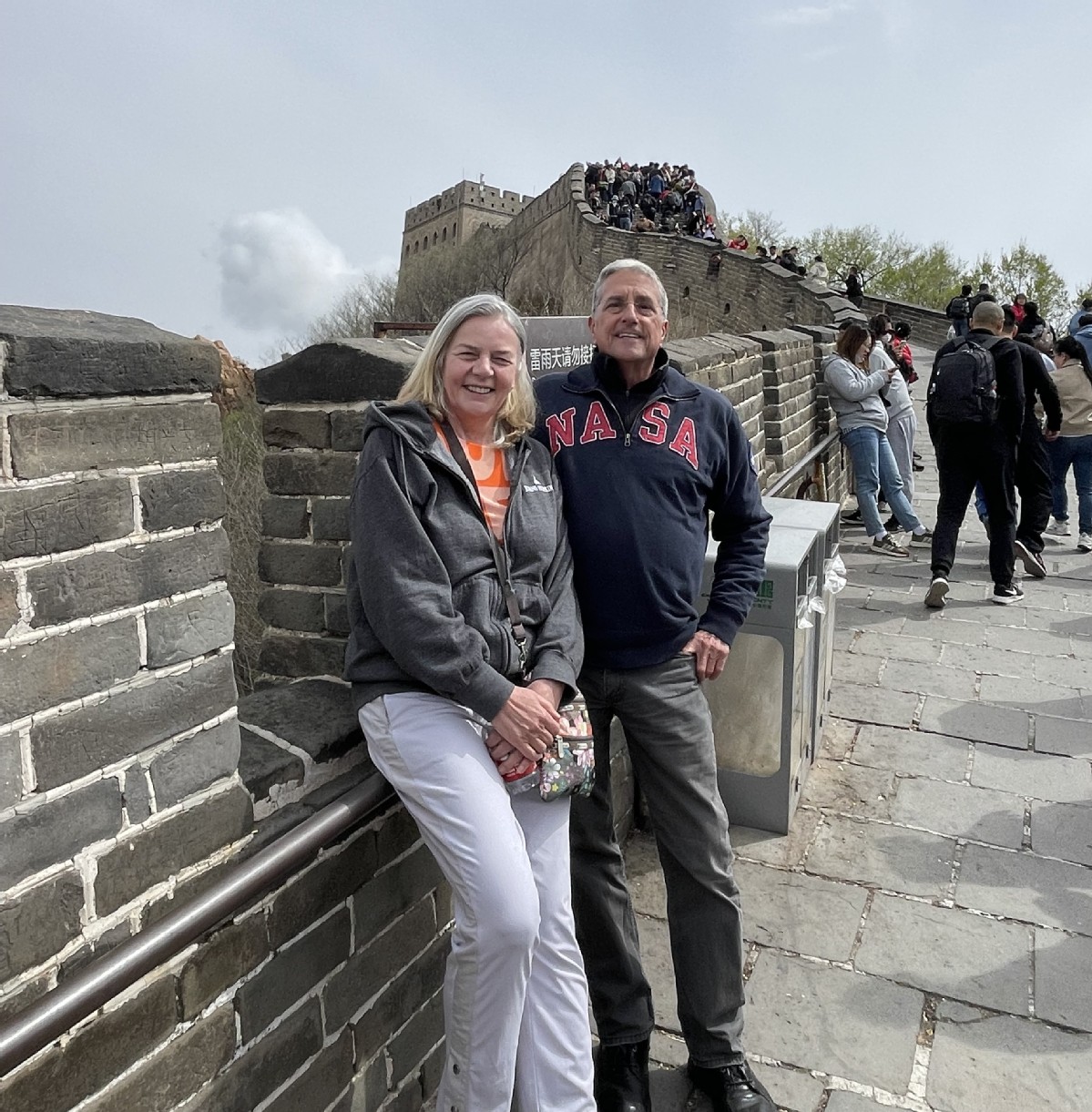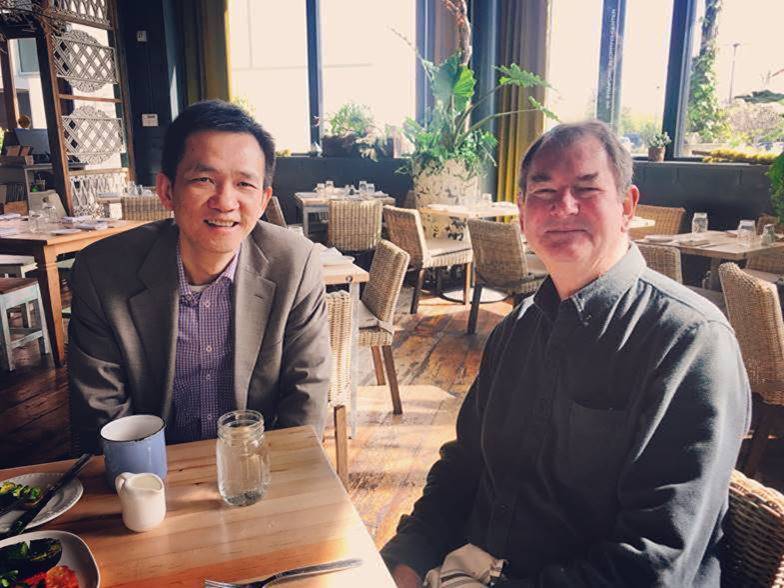


The fifth edition of the "My China Album" video series, jointly produced by the Chinese embassy in the US, the Chinese consulates general in New York, San Francisco, Los Angeles and Chicago, and China Daily, is a vivid portrayal of Sino-US relations.
Themed "My Impressions of China - 100 Stories of China-US Friendship", the series comprises 12 episodes that capture the heartwarming moments and memories of people-to-people friendship, showcasing the profound bonds and historic interactions between the peoples of the two nations.
Editor's note: More than a century ago, a number of US citizens began living in Kuliang, a famous summer retreat in Fuzhou, Fujian province, joining thousands of other foreigners. They blended with local Chinese, working and living in harmony with them. This page looks at Elyn MacInnis and her family's deep connection to Kuliang, and the essence of the human spirit, unity, love and deep-rooted heritage.
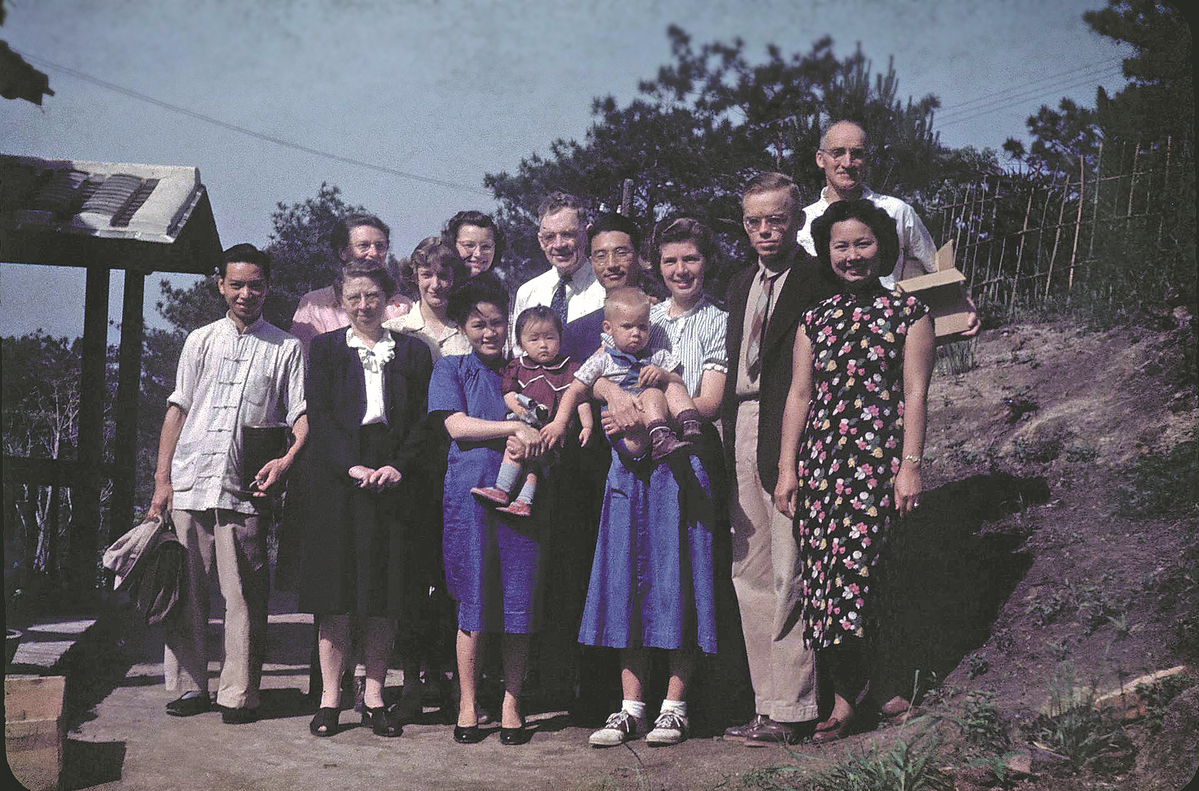
Elyn MacInnis holds a pair of small slippers, about 5 centimeters long, with their red color slightly faded over time. Despite some wear on the soles, the insoles are still soft and elastic, sturdily constructed with no gaps at the seams.
The shoes were handcrafted by a Kuliang mother thread by thread in Fujian province for MacInnis' husband, Peter MacInnis, when he was a baby 75 years ago. Also, MacInnis' daughter had worn them, and Mac-Innis' newborn granddaughter would soon fit into the shoes.
"You can see her tiny, tiny stitches," Elyn, who is also the consultant for the Kuliang history and culture research organization, said as she caressed the shoes. "It's a wonderful memento, and also like a symbol of Kuliang spirit passing from generation to generation," she said.
The shoes journeyed across the ocean and time, symbolizing the family's connection and attachment to China, and especially Kuliang, the small town hidden in the mountains in the suburbs of Fuzhou, Fujian's provincial capital.
The MacInnis family has resided in cities including Nanjing, Beijing, Shanghai and Chongqing for almost 30 years since 1988. In the 1990s, Elyn impressed many Chinese students when she taught English with an engaging smile on a popular show aired by China Central Television.
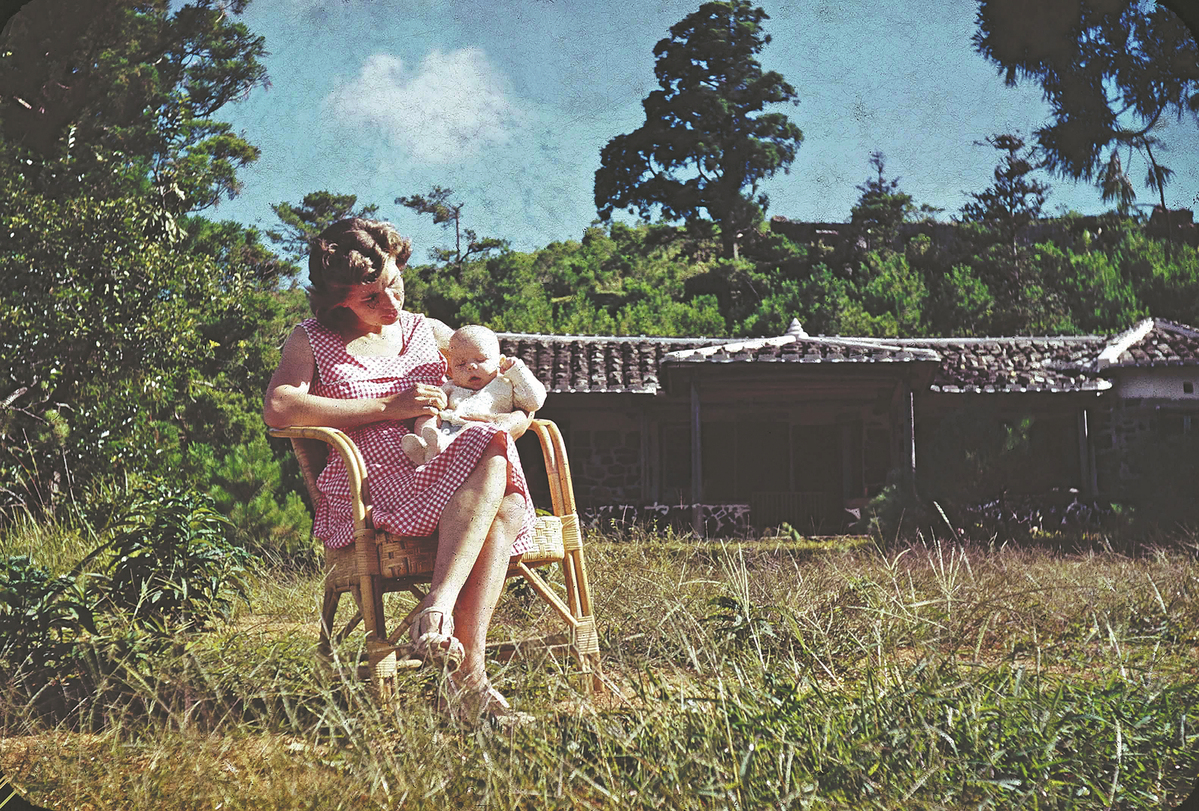
However, it was not until 2015 that MacInnis first visited Kuliang.
This visit ignited Elyn's interest in researching the area as she explored stories forgotten by time and distance, searching for the narratives of old Kuliang residents and their descendants who had traveled back from China to the United States and were now scattered across different states.
Through old maps, archives, photographs and memories, she began piecing together these disconnected tales, reconnecting them once more.
"When Elyn first began her interest in Kuliang, it was because that was part of my babyhood," Peter said. "But as she researched and met people — the true story of Kuliang, the people in Kuliang, the Chinese people and foreigners came out — it was very exciting to see what they did. That's really what has motivated Elyn, not just looking for a house or a pair of shoes, but actually looking at the people who lived there and what they did, their relationship with China, in particular, the friendship and caring that was going both ways back and forth."
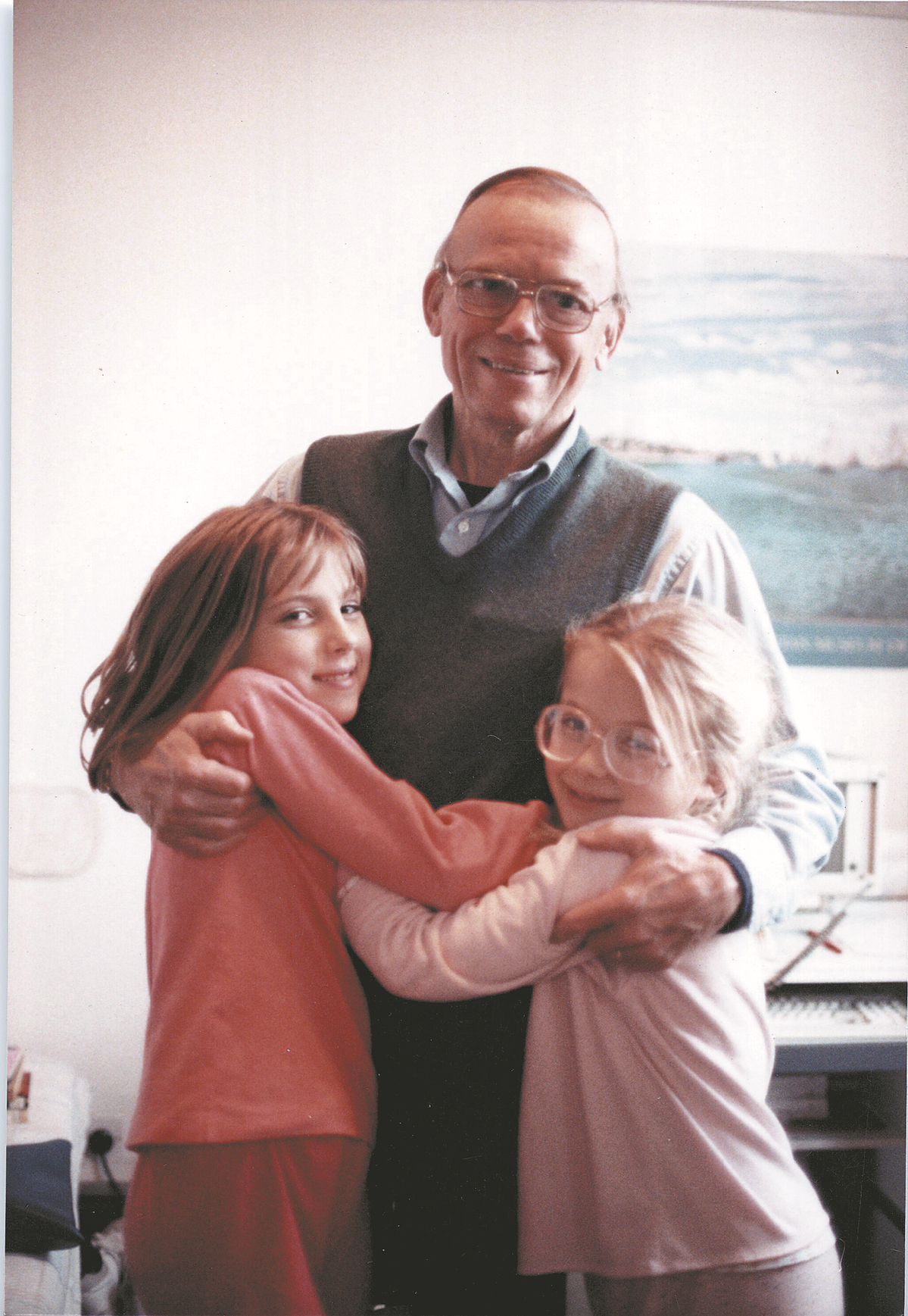
Living in harmony
Kuliang, a summer resort from the late 1800s until 1949, attracted foreigners such as merchants, businesspeople, missionaries and consular officials who lived harmoniously with local residents. At its peak, the small town had 330 villas, with a sanitarium hospital, a post office, grocery stores, a church and a clubhouse equipped with tennis courts and a stone-built swimming pool.
Beneath the lush cedar trees and morning fog shrouding the mountaintop, children enjoyed their childhoods in Kuliang, and deep-rooted friendships blossomed between the local Kuliang residents and the foreign families.
Although Peter initially could not quite remember the specifics of his infancy in Kuliang, with the assistance of a local he eventually located the site of his old family home, the "Skye", originally an island in Scotland where Peter's family came from.
"The same mountains, the same rise in the hill, the same view out toward the (Minjiang) River and then back toward the ocean," Peter said as he remembered the place of his birth and childhood.
Peter's father, Donald MacInnis, first arrived in China in 1939 to teach at a high school in Fuzhou. During World War II, he returned to Fujian with the Flying Tigers — a formidable group of US volunteer fighter pilots who from 1941 to 1942 helped China fight the Japanese invasion.
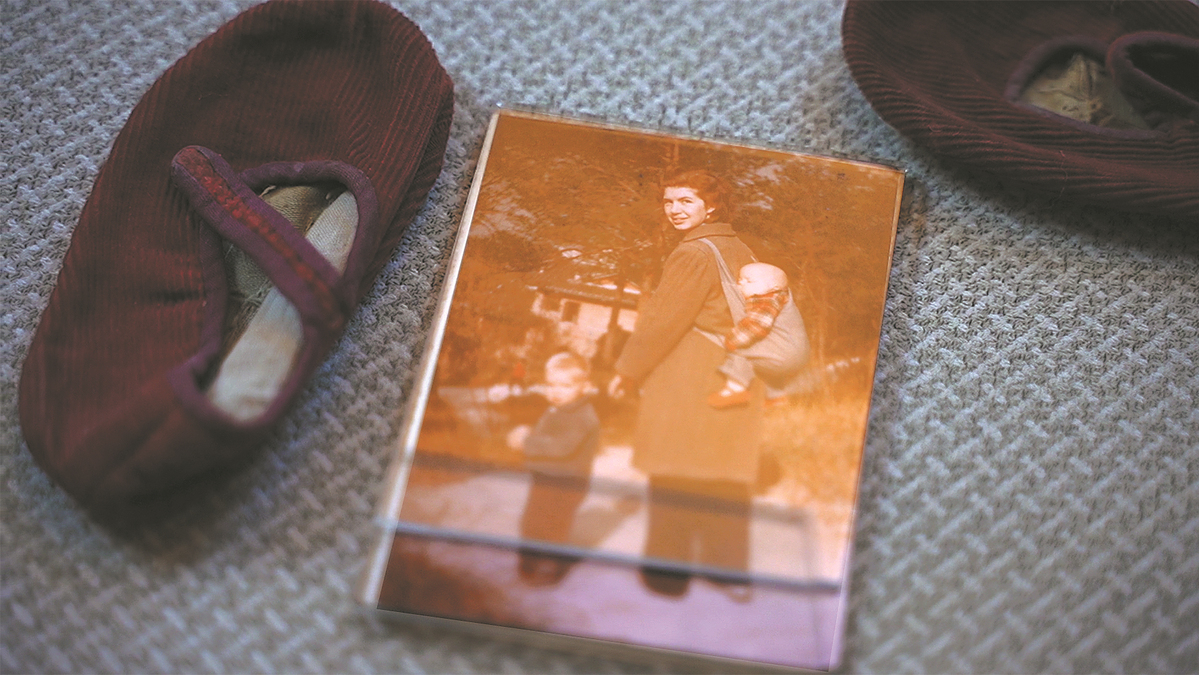
Following the war, Donald returned to China and continued teaching at Fukien Christian University in Fuzhou, where Peter was born. In 2004, at the age of 84, he made another trip to China to teach. Donald passed away in the US a year later, and in his will he expressed a wish for half of his ashes to be scattered in the Minjiang River.
"As I was growing up, we (Peter and his brother Bruce) would ask my father. My father had slides, and he put the projector on and put the slide up on the wall," Peter recalled. However, it was with Elyn that a deeper connection to the town emerged. Together, the couple began to gather "Friends of Kuliang", a group of individuals who shared similar family experiences to theirs.
Elyn and Peter crossed paths at Harvard University, where Elyn was studying religion but with a deep interest in China and Chinese culture, while Peter was majoring in East Asian studies.
As they found themselves in the same fieldwork class, working together on class assignments and school projects, Elyn gradually developed feelings for the "Chinese boy".
"You know, in our American way of thinking, wherever you're born and grow up, that's who you are. So he was Chinese! And I thought, oh, this is great," Elyn laughed and said. "When I was a child, all I wanted to do on a trip, you know, our family would take little trips, and all I wanted to do was go to Chinatown. I also want a Chinese baby. I don't know why, I was born to love China, an instinct."
Peter said with a smile, "Perhaps in a former lifetime, she was Chinese."
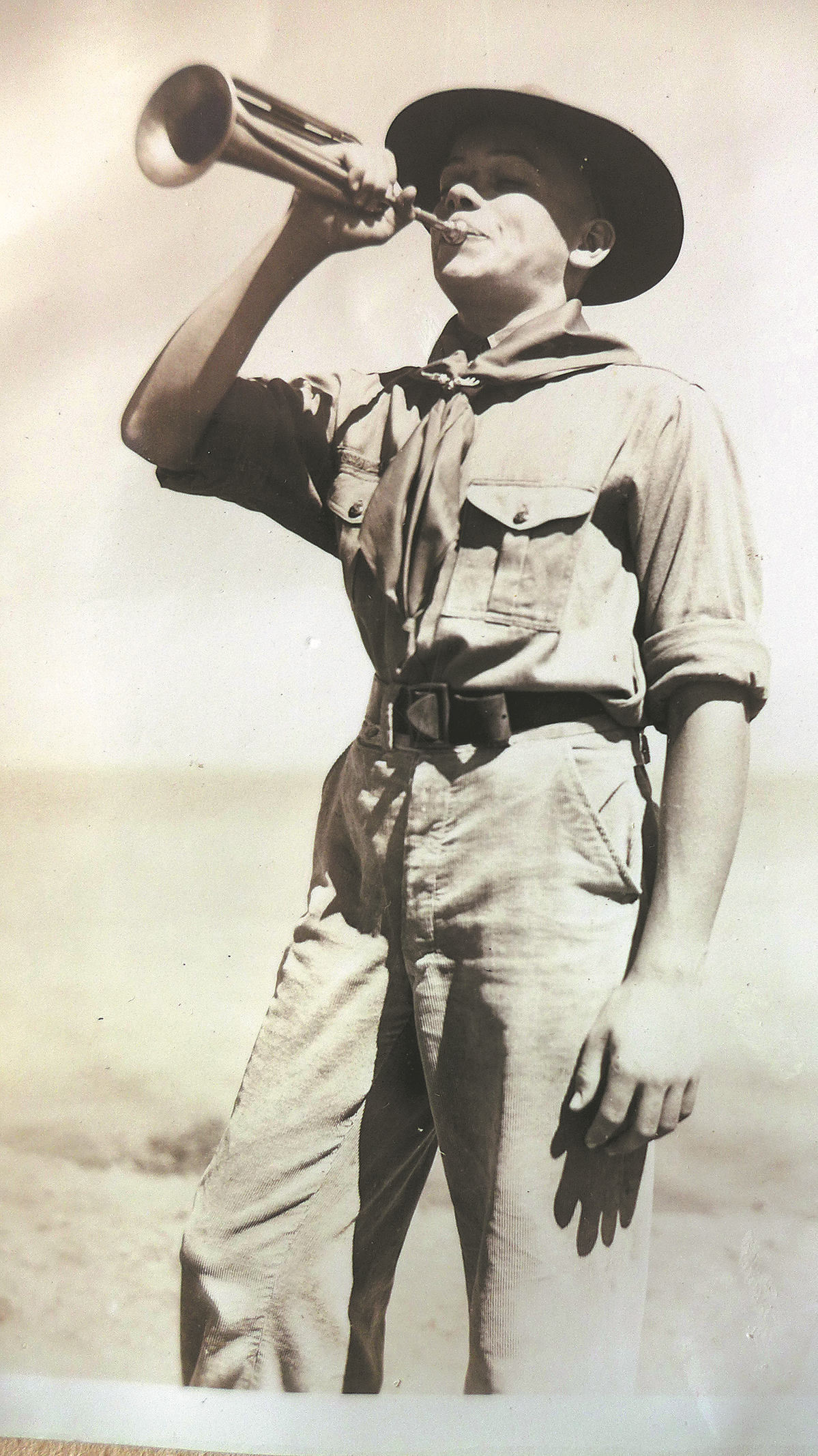
Uncovering narratives
The couple lived in China where they raised their daughters. Even after 50 years, they are still conducting research together on their topic of interest, delving into the cultural exchanges between China and the US, and uncovering the rich history and narratives of Kuliang.
"I'm the kite, and he's the string," Elyn described their collaborative work. "We are still doing our group project." While Elyn researched archives online, Peter scanned documents and conducted fact-checking.
Following their 2015 trip, the couple visited numerous libraries, gathered thousands of pieces of information and reached out to families who had lived in Kuliang.
"I wasn't looking for numbers," she said. Elyn is also working on a book that reports the story of Kuliang and the people-to-people friendship from the past to the present. "I was looking for quality of story, and I tried to find people whose families had stories to tell."
In June, Elyn returned to Kuliang to take part in the Bond with Kuliang: 2023 China-US People-to-People Friendship Forum, gathering "Kuliang's Friends" together, while also making new friends there.
"The Kuliang spirit represents 'peace, friendship and love'," Elyn said, but she added two more key elements — understanding and respect — to the people-to-people exchanges through generations of many US families.
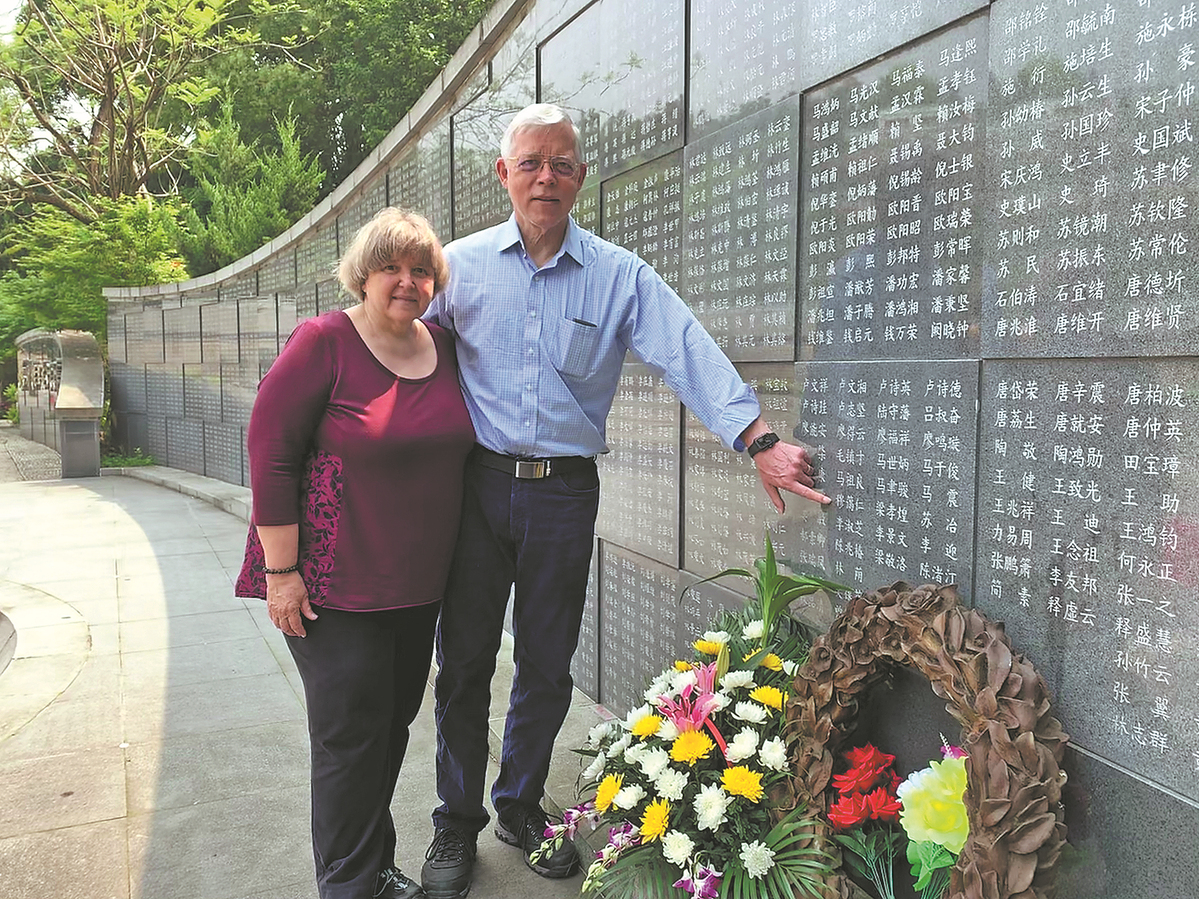
In November, Elyn met Chinese President Xi Jinping in San Francisco at a side event of the Asia-Pacific Economic Cooperation Summit. Xi, who worked in Fujian province from 1985 to 2002, had heard about the friendship of Kuliang and wrote a letter to her about her efforts in documenting and promoting such friendship.
"I don't remember exactly what I said," Elyn recalled. "We shook hands, and it was like a casual talk with an old friend as well."
Elyn said she was very happy when she heard President Xi and US President Joe Biden reached an agreement on strengthening cultural exchanges for younger children, and she said that is what she is trying to do — also pass the "Kuliang spirit" on to younger generations, not limited to families who had lived in Kuliang but to the world as well.
"The most important thing is to have a relationship. As a child, it's a wonderful time to start a friendship and to be influenced by another country. The friendship has definitely passed from generation to generation," she said.
This is similar to how her father-in-law passed the connection to her and Peter, and how Elyn, in turn, passed that connection to her daughters, whose Chinese names are Ai Zhong and Ai Hua. Combined, they mean ai zhonghua, which translates into "love China".
"If China and the US can begin to make a beginning in this and carry it further, I think it will influence the other countries as well," Peter said.
Editor's note: China Daily Global Edition offers the series Friends Afar to tell the stories of people-to-people exchanges between China and other countries. Through the vivid narration of the people in the stories, our readers can get a better understanding of a country that is boosting openness.
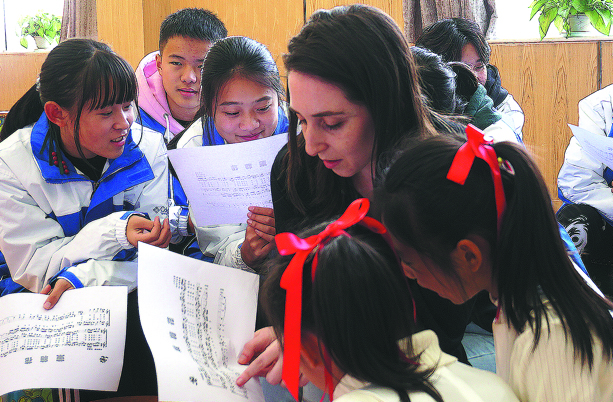
Kayla Raden, who is in her mid-30s, now works as a payroll administrator for a company in North Carolina after deciding several months ago to take a break from years of teaching. But memories of her experiences in China are never far away, and her love for the country remains strong.
"All of my colleagues are Chinese, so I get to speak Chinese all day and eat Chinese food more than twice a week," Raden said while describing her current daily life to China Daily.
Learning Chinese is something Kayla does every day. "I log in to all my different apps. First thing in the morning, I practice Chinese."
When talking about China, including when she taught in the country from 2016 to 2017, her trip in 2018 organized by the Confucius Institute, and her online education involving Chinese students, a smile lights up Raden's face.
"I really do hope to return when it is possible," she said.
Raden first went to China in 2016, but her interest in the country can be traced to her childhood.
Because her birthday is on Dec 24, which is Christmas Eve, her parents would want to take her out to celebrate her birthday. But the only restaurants open on that day were Chinese restaurants, according to Raden. "And my parents would always take me shopping and buy me little gifts from the little stores in Chinatown. So I always associate this deep happiness with eating Chinese food and going to Chinatown."
Furthermore, her best friend when growing up was Chinese American, so she always wanted to know more about China.
When Raden went to Epcot Theme Park at Walt Disney World Resort in Florida while in high school, she spent the whole time in the China Garden there, thinking about visiting the country someday.
The opportunity would come a few years later.
After Raden graduated from college and started her career, she saw a job opening for a chemistry teacher in Shanghai. Raden applied for the job and got it. She went to China to teach at an international high school in Fengxian district of Shanghai from 2016 to 2017.
"I just fell in love with the culture," said Raden. That's also when she began to learn Chinese.
"I had made some friends who are native Chinese speakers, so they would always help me and sometimes only speak to me in Chinese, which was frustrating, but definitely like a crash course," she said.
After returning to the US after one year of teaching, Raden felt "very homesick" for China, she said, so she began studying at a Confucius Institute in New York and made fast progress.
She then began to work for the Confucius Institute, now known as the Center for Language Cooperation and Education. Raden said it was "an incredible experience. It was like all my dreams coming true. All I did was engage with the community and encourage Chinese-language learning."
In 2018, Raden received the People-to-People Award from the Confucius Institute US Center and joined the 2018 Confucius Institute alumni trip to China.
During that trip, Raden went to a Peking Opera art school in Sichuan province. "They took us to their rehearsal room, and they gave us more information about their costumes and how they practice and the historical significance," Raden said.
She volunteered to try on a costume and was taught by a girl how to move her hands with the sleeves. "I enjoyed it so much because they kind of exposed me to things that I don't think I would have found on my own," Raden said.
They also went to see pandas during that trip. "That was the highlight. That was what everyone was completely excited about," she said.
While Raden kept learning Chinese and thinking about returning to China to continue her teaching career, the COVID-19 outbreak occurred.
In 2020 and 2021, she taught students in Suzhou online. She needed to wake up at 4 am because of the time difference, but she felt lucky to teach the students because "they were so motivated".
When talking about her interactions with Chinese students in Suzhou, Raden still feels motivated and touched.
"I remember they sent me a Christmas card, a handwritten Christmas card. They mailed it, and I was just so touched by that gesture," she said. "Just because during COVID it was very isolating, and I felt kind of alone. And then I got this little card in the mail, and I was like, how sweet."
Raden also remembered the girl who helped her savor Peking Opera and the boy who helped her order bubble tea when she went to China for the first time and spoke no Chinese. She said the Chinese people always offered to help when she looked lost.
During her time in China, Raden loved walking around West Lake in Hangzhou, Zhejiang province, enjoying teahouses in Suzhou, and visiting the Great Wall in Beijing. But the Chinese people impressed her the most.
"When I think of China, I think of the people. Because you can go to the most beautiful places in the world, but if you don't feel a sense of warmth when you go there, you're not going to have a connection to the place," Raden said.
She said people in the United States and China have many things in common.
"I talk about my experiences in China and how my students in China like the same stuff that my students here like. They like the same movies, they like the same music," Raden said. "We all have the same aspirations and dreams. We want to take care of our families. We want to be safe, we want to be happy. And even though we maybe have different life philosophies, at the end of the day, we want the same things."
Raden said that studying Chinese has transformed how she thinks, solves problems and views the world. "I think that studying Chinese has made me a more empathetic person," she said.
"If more Americans studied Chinese and maybe learned more about Chinese culture, there'd be a lot less misunderstanding," she said.
Raden has a dream of running a tourism company offering educational tours that take students from the US to China, because the impression of such trips is lasting. "You remember those for life."
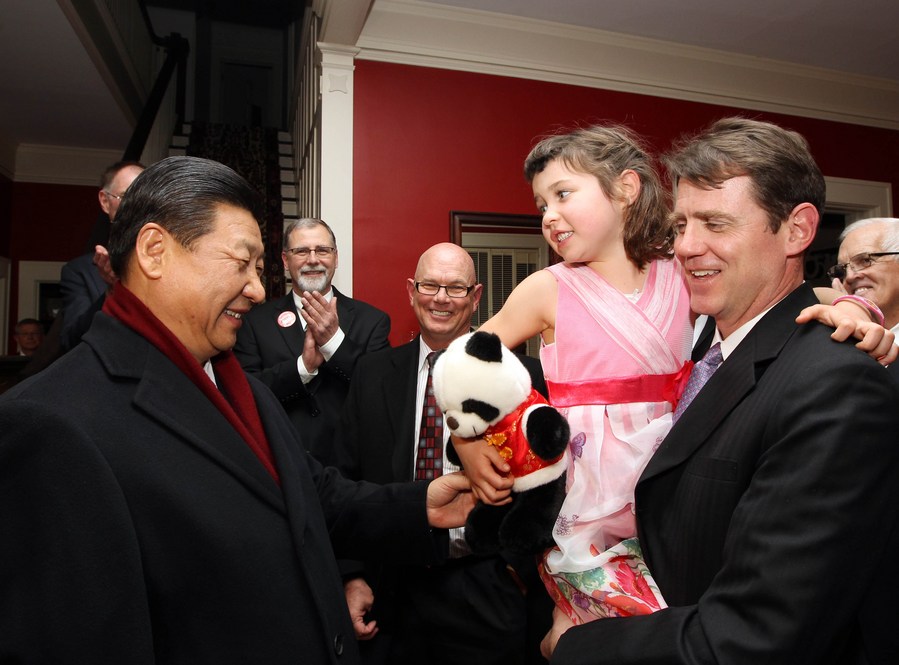
The author Mark Twain once described the memorable sunsets in Muscatine, a small city on the banks of the Mississippi River in the US state of Iowa, as particularly memorable.
In his 1883 book Life on the Mississippi, Twain wrote: "And I remember Muscatine — still more pleasantly — for its summer sunsets. I have never seen any, on either side of the ocean, that equaled them."
Today, a large corn processing plant operates in Muscatine on the banks of the river. President Xi Jinping visited the plant in 1985, when he was Party chief of Zhengding county in Hebei province, and learned about agriculture.
Most people in Muscatine, whose population is around 24,000, are farmers or hold jobs related to agriculture. Farms and wind turbines are the most common sights in the city, which is a two-and-a-half-hour drive from Des Moines, the capital of Iowa.
Dan Stein, chairman of the Muscatine-China Initiatives Committee and a native of Muscatine, conceded that life in the small city is slow-paced.
"There isn't much going on in Muscatine," he said.
However, 38 years ago, when Xi led an agricultural delegation from Hebei, his trip to Iowa had an impact on many people in Muscatine.
"It changed my life," said Stein, a banker whose clients are mostly local farmers, and who is also involved now in the import and export business between China and the United States' Midwest.
In 1985, the trip's organizers contacted Eleanor and Thomas Dvorchak and said they were looking for homestays in Muscatine for a Chinese delegation. The Dvorchaks, whose sons were away at college, happened to have two bedrooms available. Xi, who led the delegation to Iowa, stayed the night in the bedroom of Gary Dvorchak, who is now an investor and has been living in Beijing for more than a decade.
The homestay occurred before the internet era and, as the years passed, the Dvorchak family lost track of the delegation member. Then, in 2012, the family discovered that the young man who had stayed in their home years before was China's vice-president.
Xi said he wanted to go to Iowa and visit his Iowa friends again, and a reunion was held in Iowa in 2012 when he visited the US as vice-president.
"We were all just surprised to encounter someone who has stayed in your home and then later, he rises to such greatness and becomes so famous. ... Of course, we're happy for him that his career went so well. But everyone was just like, 'Wow, I can't believe this really happened'," Gary Dvorchak told China Daily in a recent exclusive interview.
Now, walking into the bedroom at 2911 Bonnie Drive — the address where Xi stayed in 1985 — a visitor will see a massive oak tree still standing outside the window.
The house, which is white with red bricks, features a master bedroom and two guest bedrooms. Xi slept in one of the guest bedrooms at the end of a hallway. Today, the home is a museum called the Sino-US Friendship House.
"I can envision him being in America for the first time, looking outside and, obviously, the architecture and home decor are very different from China. And this huge oak tree back then probably was not so big, but it continues to grow," Stein said.
Gary Dvorchak said his room, decorated with a Star Trek theme, was "very much the room of a child".
"I was a huge Star Trek fan. I love science fiction, so I had shelves of Star Trek and Star Wars models," he added.
In 2012, when Xi returned to Muscatine, he told those who had gathered, whom he has affectionately referred to as "old friends": "You were the first group of Americans that I came into contact with. My impression of the country came from you."
Sarah Lande, an 85-year-old Muscatine resident who helped coordinate Xi's 1985 visit and met with him, also recalled that Xi told the friends gathered in 2012, "To me, you are America."
During the 2012 reunion, "everyone was a little nervous, but mainly happy and very relaxed. In his role as a vice-president, he came there as a friend. There was no talk about policy; the talk was (focused on) reminiscing," said Gary Dvorchak.
In November, Xi once again reunited with his old friends from Iowa, this time in San Francisco, where he and US President Joe Biden held a summit.
"There was genuine happiness, so you could see the smile on his face, he was really enjoying it," said Dvorchak. "What's really wonderful is that, to him it has personal meaning. It's not just publicity. It's the people he really cares about from the experience he had way back then."
Xi wrote in a letter to Lande, who is also author of a 2022 memoir titled Old Friends: The Xi Jinping-Iowa Story, "The Chinese and American people are both great people, and our friendship is not only a valuable asset, but also an important foundation for the development of bilateral relations."
Because of Xi's trip, Muscatine, an agricultural city in the heartland of the US, became a bond for Sino-US friendship exchanges.
Every year, students at Muscatine High School participate in study programs in China. In 2013, at Xi's suggestion, Muscatine became a sister city of Zhengding county, where Xi was serving when he first visited Muscatine.
In 2015, the Muscatine Center opened in Jinan, Shandong province. In addition, the Musser Public Library in Muscatine houses over 500 books on Chinese culture, some in both English and Chinese, according to Muscatine's official website.
"This whole story has inspired people in China and in America, but especially people in China to come to America and learn what it was Xi Jinping experienced that was so great that (they think) 'hey, I want to go and see what this is'," Dvorchak said.
"It has become an inspiration for people to learn about each other, and it goes in the other direction, that people from Iowa go to China all the time. The house is really a great inspiration to promote people meeting each other."
minluzhang@chinadailyusa.com
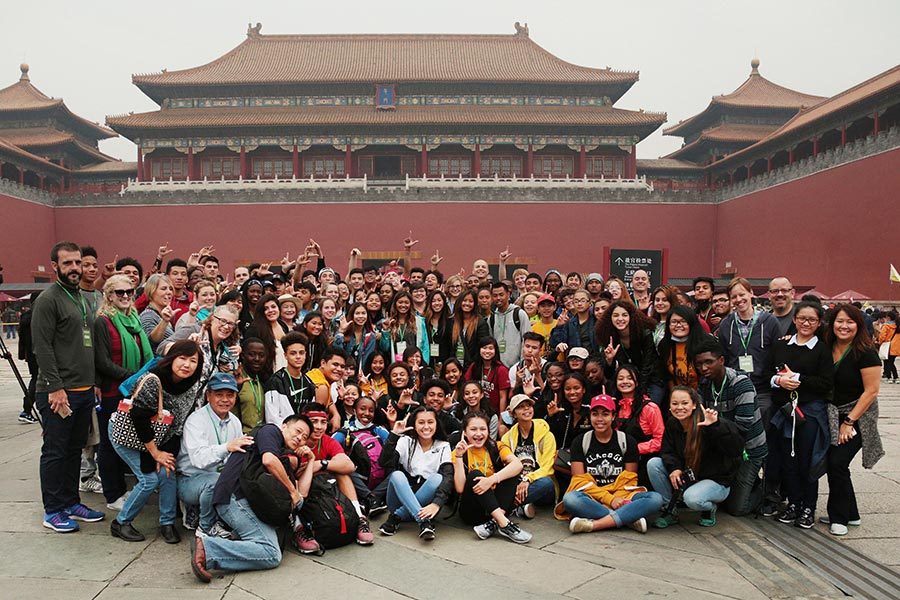
The fifth My China Album, co-sponsored by China Daily USA and the Chinese embassy in the United States, will chronicle the many touching stories of China-US friendship, capturing significant moments and recording the voices of those who consider China a friend afar.
Chinese President Xi Jinping has frequently expressed that to nurture China-US relations, the hope and foundation reside in the people, the future lies with the youth, and the vitality comes from the subnational level.
Through our 12 video episodes and serial articles, we feature a wide array of topics from joint efforts on subnational levels to battling climate change, to restoring and preserving habitats for giant pandas, to how the power of music strikes a sympathetic chord in the hearts of audiences in both countries.
My China Album collects the shared legacy of both the United States and China, for example, the legend of the Flying Tigers. Our reporters have traced the footsteps of the Flying Tigers World War II veterans to rekindle the wartime friendship.
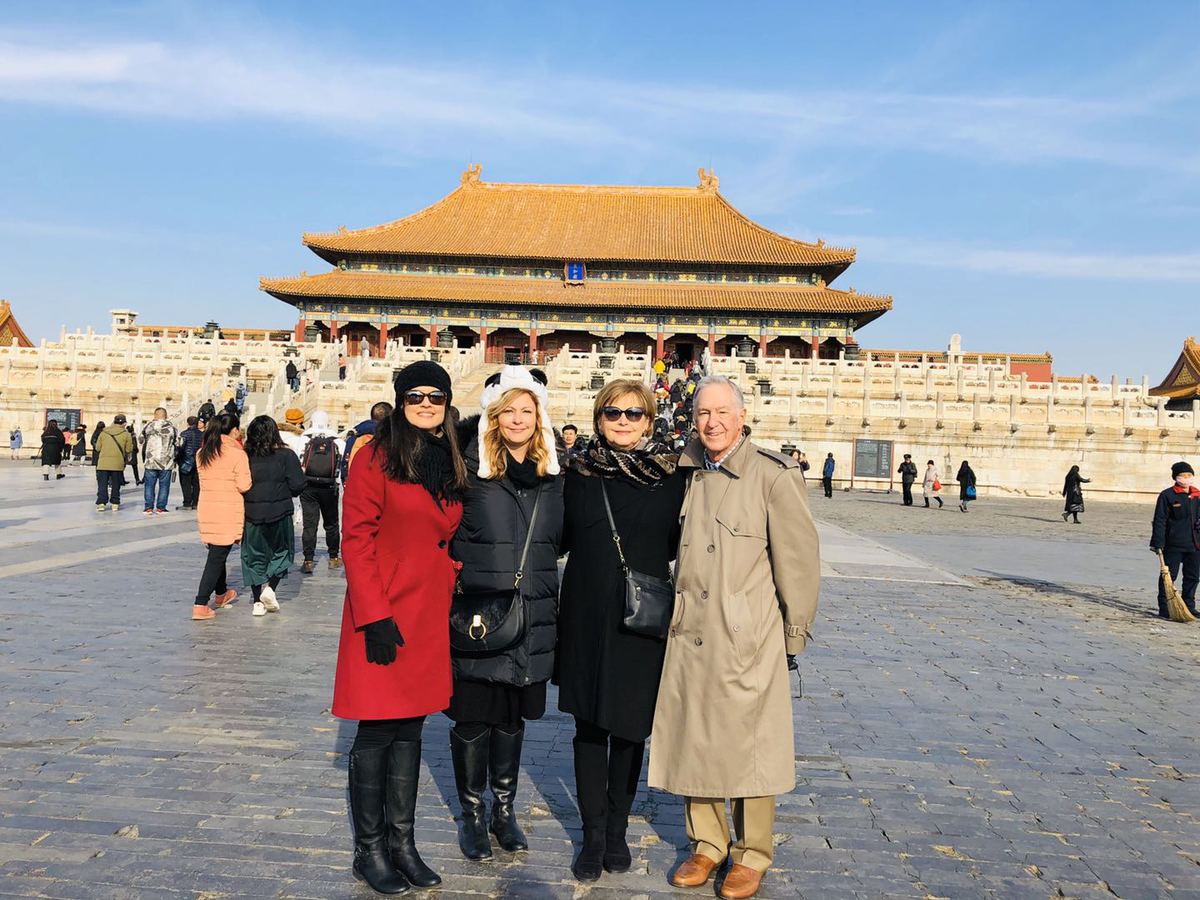
In 1941, a group of American volunteer pilots led by General Claire Lee Chennault, commander of the Flying Tigers, joined Chinese comrades to fight shoulder to shoulder against the invading Japanese Army.
The Flying Tigers flew over the Himalayas, helping transport most-needed strategic supplies to break through the Japanese blockade and then celebrated with their Chinese brothers and sisters when the final triumph came.
In his September letter, President Xi wrote to Flying Tigers veterans Harry Moyer and Mel McMullen that, "in the past, our two peoples fought the Japanese fascists together, and forged a deep friendship that withstood the test of blood and fire. In the future, the two major countries shoulder even more important responsibility for world peace, stability and development."
In another letter he sent in August in response to the US-China Youth and Student Exchange Association, Xi said he hoped that more young people from China and the United States would get to know each other and move forward together; become generational ambassadors for bilateral friendship; and inject impetus into the development of bilateral ties.
My China Album also documents the growing interest among the young American generation's exploration of Chinese culture.
Clint Liddick, a Californian fluent in Chinese, spent years in China gaining first-hand knowledge of Chinese martial arts before opening his own kung fu school.
John Smagula, a judicial system scholar at Temple University in Philadelphia, indulged China's tea fermenting and cultivation skills so much so that he has become a self-trained expert.
Davyd Booth, cellist in the Philadelphia Orchestra, anticipates more visits to China to collaborate with Chinese counterparts.
Regardless of differences in age, race and background, our storytellers share the belief that to advance China-US friendship, what is needed is mutual respect, reciprocal appreciation, willingness to withstand difficulties together, and painstaking efforts to nurture, retain and sustain the relationship.
We are hopeful that My China Album can increase mutual understanding, enhance mutual respect and propel the healthy development of China-US relations.
junechang@chinadailyusa.com
